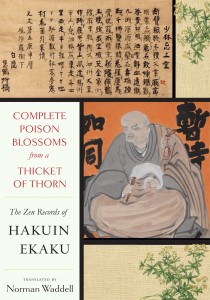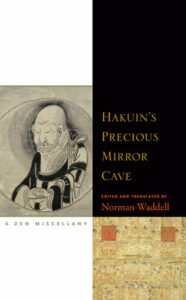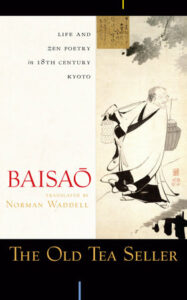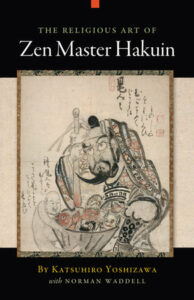Norman Waddell
Norman Waddell was born in Washington, D.C., in 1940. He has published more than a dozen books and is considered one of the finest translators of Japanese sacred texts of our time.
Subscribe to our newsletter for news & events from Counterpoint Press.
Books
Complete Poison Blossoms from a Thicket of Thorn
The Zen Records of Hakuin Ekaku
Following his translation of just over half the original text in 2014, Norman Waddell presents the complete teaching record of Zen master Hakuin, now available in English with extensive explanations, notes, and even the wry, helpful comments that students attending Hakuin’s lectures inscribed in their copies of the textWith this volume, Norman Waddell completes his acclaimed translation of the teaching record of one of the greatest Zen masters of all time, Hakuin Ekaku (1685–1769). Hakuin lived at a time when Japanese Buddhism as a whole and his own Rinzai sect in particular were at low ebb. Through tremendous force of character and creative energy, he initiated a reform movement that swept the country, and today, all Rinzai Zen masters trace their lineage through him. This outcome is all the more extraordinary because Hakuin’s base of operations was a small temple in the country town of Hara, where he grew up, not in one of the nation's political, cultural, or commercial centers.
This book represents the first full publication of the Keisō Dokuzui in any foreign language. Inspired by the enthusiastic reception that greeted his 2014 selections from the text, Waddell returned to work and now gives us the opportunity to examine the entirety of Hakuin's record and to benefit as never before from the example and instruction of this exuberant personality and remarkable teacher. Poison Blossoms contains a highly diverse set of materials: formal and informal presentations to monastic and lay disciples, poems, practice instructions, inscriptions for paintings, comments on koans, letters, and funeral orations. While most items are brief, easily read in a quick sitting, the book also includes extended commentaries on the Heart Sutra, one of Mahayana Buddhism’s central texts; on the famously difficult Five Ranks of Tung–shan; and on the accomplishments of his eminent predecessor Gudō Tōshoku.
Having devoted himself for more than three decades to the study and translation of Hakuin's works, Norman Waddell is peerless when it comes to conveying into English the vital, sometimes elegant, often earthy voice of this outstanding teacher. His command of the subject enables Waddell to elucidate the vast array of idioms and images that Hakuin employed to enliven his poetry and prose—historical and mythological elements, street slang, doctrinal and cultural allusions that would otherwise place these writings beyond the grasp of anyone but a specialist. Waddell's five previous Hakuin translations, each important in its own right, can now be recognized as stepping stones to this towering achievement.
Hakuin’s Precious Mirror Cave
A Zen Miscellany
The two great streams of Zen Buddhism are the Soto sect, known as the School of Silent Illumination, and the Rinzai school of rigorous koan study. Dogen established Soto Zen in Japan, and his work is widely known in the West with many of his books translated into English. Hakuin is credited with the modern revival of the Rinzai sect and is its most important teacher. His life has been a great inspiration to the students and practitioners of Zen in the West, and his writings offer great authority and practical application.Norman Waddell has devoted a large part of his life to translating and publishing work by and about Hakuin. This collection of six diverse and independent works contains five pieces never before translated into English, some of which have been—until quite recently—unknown, even in Japan. A rich and various gathering, the offerings here will be important to seasoned practitioners as well as attractive to newcomers to Zen and spiritual seekers of all faiths.
The Old Tea Seller
Life and Zen Poetry in 18th Century Kyoto
Poet, Zen Buddhist priest, renowned thinker, and seller of tea — Baisao was all of these things, as well as being a bit of an eccentric. Known to carry large wicker baskets filled with tea utensils through the streets and surrounding hills of Japan's capital, Baisao set up shop wherever he ended up and brewed tea for those who came to enjoy the scenery with him. Establishing a quiet, simple life, Baisao spent his final years composing poetry, brewing tea, and teaching Zen, in the process becoming a well–loved figure. These poems, memoirs, and letters tell us more about this endearing person and trace his long life's profound spiritual journey. This comprehensive translation includes nearly all of Baisao's writings, giving us a deep look at this remarkable man.The Religious Art of Zen Master Hakuin
A charismatic and extraordinary Zen teacher and artist, Hakuin (1686–1769) is credited with almost single–handedly reforming and revitalizing Japanese Zen from a state of extreme spiritual decline. As a teacher, he placed special emphasis on koan practice, inventing new koans such as the famous "What is the sound of one hand clapping?" He also stressed the need to extend the benefits of Zen to others.What made Hakuin even more remarkable was that he was not only a religious teacher but also a prolific artist. Using calligraphy and painting to create "visual Dharma," his teachings were rendered on paper in pictures, characters, and images, uniquely and magnificently expressing the nature of enlightenment as he wished to impart it to his students.
The Religious Art of Zen Master Hakuin is a stunning volume containing many of Hakuin's finest calligraphies and paintings, along with brilliant commentary by Katsuhiro Yoshizawa, the leading Japanese expert on Hakuin and his work. Yoshizawa masterfully guides the reader from one piece of artwork to the next, sharing the story of Hakuin's life, revealing the profound religious meaning embedded in each illustration, and providing a detailed documentary of the lessons of one of Zen's most respected teachers.

Catapult | Counterpoint | Soft Skull
1140 Broadway #706
New York, NY 10001
646.926.0805 | info@counterpointpress.com








